Luis Rubiales confirmed his resignation as president of the Spanish football association on September 10. On October 30 he was banned from “all football-related activities” for three years by FIFA. On January 25 Spain’s National Court recommended the case investigating his kiss on Jenni Hermoso go to trial.
Advertisement
“I’m going to keep fighting,” said Luis Rubiales with characteristic vehemence.
“But I’ve been working a long time without a holiday, and I need to rest too. So after this assembly, I’m going to spend some days with my mother, my sister, and my niece. With my daughters. And I hope to be able to disconnect. I’ll be in Motril.”
This was how Rubiales ended his astonishing speech at the Spanish Football Association (RFEF) headquarters near Madrid last Friday.
Rubiales had been expected to resign as RFEF president, following the uproar within Spain and internationally caused by his planting a kiss on the lips of Spain forward Jenni Hermoso during the presentation ceremony after she and her team-mates won the Women’s World Cup final the previous Sunday.
But instead, he used his speech a few days later to present himself as a victim of an orchestrated campaign to oust him, in which he claimed Hermoso was now playing a part.
By the time FIFA, world football’s governing body, acted by temporarily suspending Rubiales from all football activities for 90 days this past Saturday, Rubiales was already in Motril, his hometown on Spain’s south coast.
For months, the 46-year-old former full-back had planned to again pull on the blue and white Motril CF shirt, where he began his playing career, for an ‘Amigos de Luis Rubiales’ game to be played behind closed doors that evening at the city’s 4,400-capacity Escribano Castilla stadium. Friends and former team-mates had already bought meat for the post-match barbecue.
Read more: Spain manager defends applauding Rubiales’ speech: ‘I couldn’t control my emotions’
However, when a local group said they would show up to protest against Rubailes and show support for Hermoso, city authorities decided that “due to the possibility of potential crimes against public order” the game could not take place.
Advertisement
That situation escalated much further on Monday morning, when Rubiales’ mother, Angeles Bejar, entered Motril’s Church of the Divine Shepherdess to begin a hunger strike aimed at getting Hermoso to say she had given Rubiales consent to kiss her.
The Athletic arrived in Motril a few hours later and spent the next three days following the events in the city, witnessing Bejar’s bizarre photocall and interview from inside the church on Tuesday, and speaking with more than 20 locals about the events which shone a global spotlight on one of the least well-known corners of Spain.
The main protagonist of the whole scandal — Rubiales himself — stayed hidden from view. But it was possible to build a portrait of a man whose power within Spanish football was surely over.
Motril is an hour’s drive east of Malaga, and just under an hour’s drive south of Granada. It is significantly smaller and less-visited than either of its neighbours. This part of the Andalusia region is famous for its pretty white towns. Motril is not one of those either.
The most famous son, by far, of this city of around 60,000 inhabitants, Rubiales played almost 100 games across Spain’s top two divisions, then became president of the AFE, the country’s footballers’ union, soon after retiring in his early thirties and since 2018 has been president of the national FA.
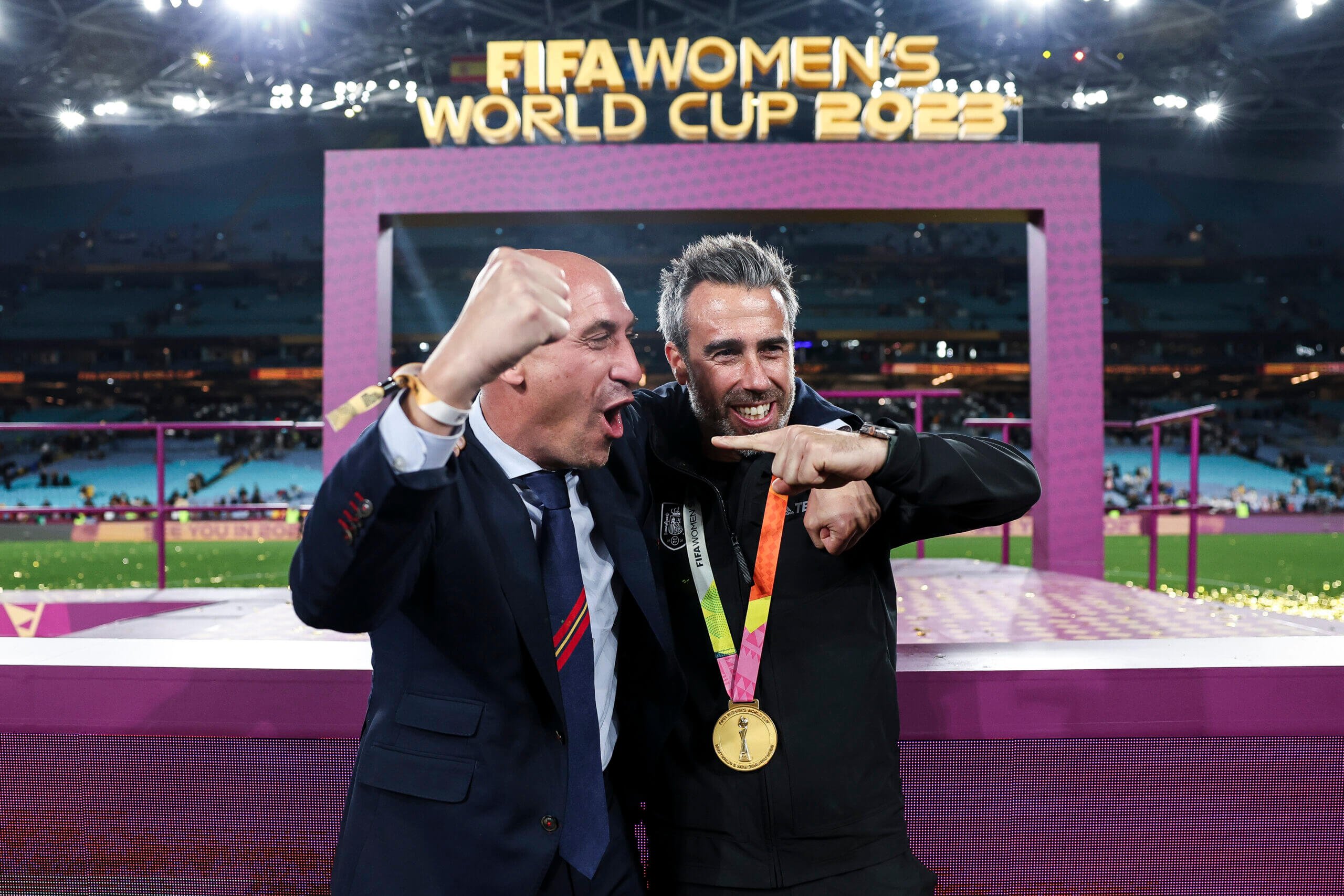
Although he was born in Las Palmas in August 1977, after the family had moved to the Canary Islands for work reasons, Rubiales grew up in Motril and has a close affinity with the community there.
As a footballer, he made his senior debut in the Andalusian regional league with Motril aged just 14, before joining the youth ranks of La Liga club Valencia. He did not quite make it to the top, but never shirked a challenge as a tough defender for Spanish clubs including Levante and Xerez, before finishing his career with three Scottish Premier League appearances for Hamilton Academical in 2009.
Advertisement
Along the way Rubiales picked up a law degree, and always showed a liking and aptitude for political battles.
In 2010, he became president of the Association de Futbalistas Espanyol (AFE) by outmanoeuvring the union’s chief of 22 years, Gerardo Gonzalez Movilla. He then quickly set about taking on La Liga president Javier Tebas, and was the face of a players’ strike that delayed the start of the 2011-12 season, with support from then-national team stars Iker Casillas and Xavi.
“Rubiales is a guy who needs to be the centre of attention,” says a source who worked with him around that time but declined to be named for this story, as did many others, to protect relationships.
Intentado entender el beso de Rubiales a Jenni Hermoso. pic.twitter.com/6IiIPfT8cw
— Memphys Colina (@MemphysColina) August 20, 2023
Rubiales always had his eye on a more powerful position than whichever one he held. He was heavily involved in the motion of censure which led to Angel Maria Villar being deposed as RFEF president, after 29 years, in 2017. He had already been courting support among the power-brokering barons at Spain’s regional football federations, and easily won election as Villar’s replacement the following year.
His first official day as federation president was a harbinger of what was to come. He spent the morning giving a deposition in a Valencia court, then took the fast train the 300km (almost 200 miles) to Madrid for his confirmation, which was attended by his parents and his three daughters, but not their mother as the couple had by then separated.
Among Rubiales’ first acts as president was to dismiss men’s national-team coach Julen Lopetegui on the eve of that summer’s World Cup finals after it emerged he had agreed to step down and manage Real Madrid in the following club season. Although that torpedoed Spain’s chances of success in the tournament, Rubiales remained 100 per cent sure he had made the right decision. “(Barack) Obama told me that there are times when you just have to act,” he revealed after returning from Russia.
“On the pitch, he was always intense, always strong,” says a former federation employee. “And his management of the federation has been the same. He is a very extroverted guy; everything that he feels he expresses, with a very authoritarian way of acting.”
Advertisement
Clubs who do not agree with RFEF policy under Rubiales have received legal letters threatening them with expulsion from their division. An official at one third-tier club told The Athletic that, during meetings at the body’s offices, all visiting executives must leave their phones, turned off, on the table so Rubiales knows he is not being recorded.
After 2018, some women were put into significant roles at the federation, however over time they have all either left or been sidelined. Women’s football had never received enough resources or attention in Spain — the 2023 tournament they won this month was only the third World Cup the team have qualified for — and Rubiales did not change a long-running culture of sexism within its hierarchy and workings.
“The treatment we received was not correct, there were sexist attitudes, from many people there,” says a female coach who left the federation because of it.
The new RFEF president was also very keen to surround himself with people he knew and trusted.
His former Levante team-mate Felix Ettien was hired to be the federation’s official driver. Rubiales even hired his uncle Juan as his chief of staff.
Juan Rubiales had worked for 25 years as a journalist with the Antena 3 national TV station, covering current affairs and politics.
When his nephew was running for AFE president, Juan ran the campaign, writing press releases and organising events.
When Luis moved on from that post to the RFEF, he hired Juan, his father’s brother, to be his chief of staff, putting someone he was sure he could trust, a family member, right at the heart of his presidency.
“After Luis Rubiales, the person who knows most about what happened, was his uncle,” says a source who worked at the federation in those years.
This partnership ended in August 2020, when Juan surprisingly left the federation.
Advertisement
Staff at RFEF headquarters in Las Rozas, a short drive west of Madrid, were first told that the departure was amicable and had been agreed in advance. However, that explanation was blown up in May last year when Juan made a statement to Spanish government anti-corruption investigators alleging his nephew had misused federation funds. Rubiales and the RFEF strongly denied these allegations.
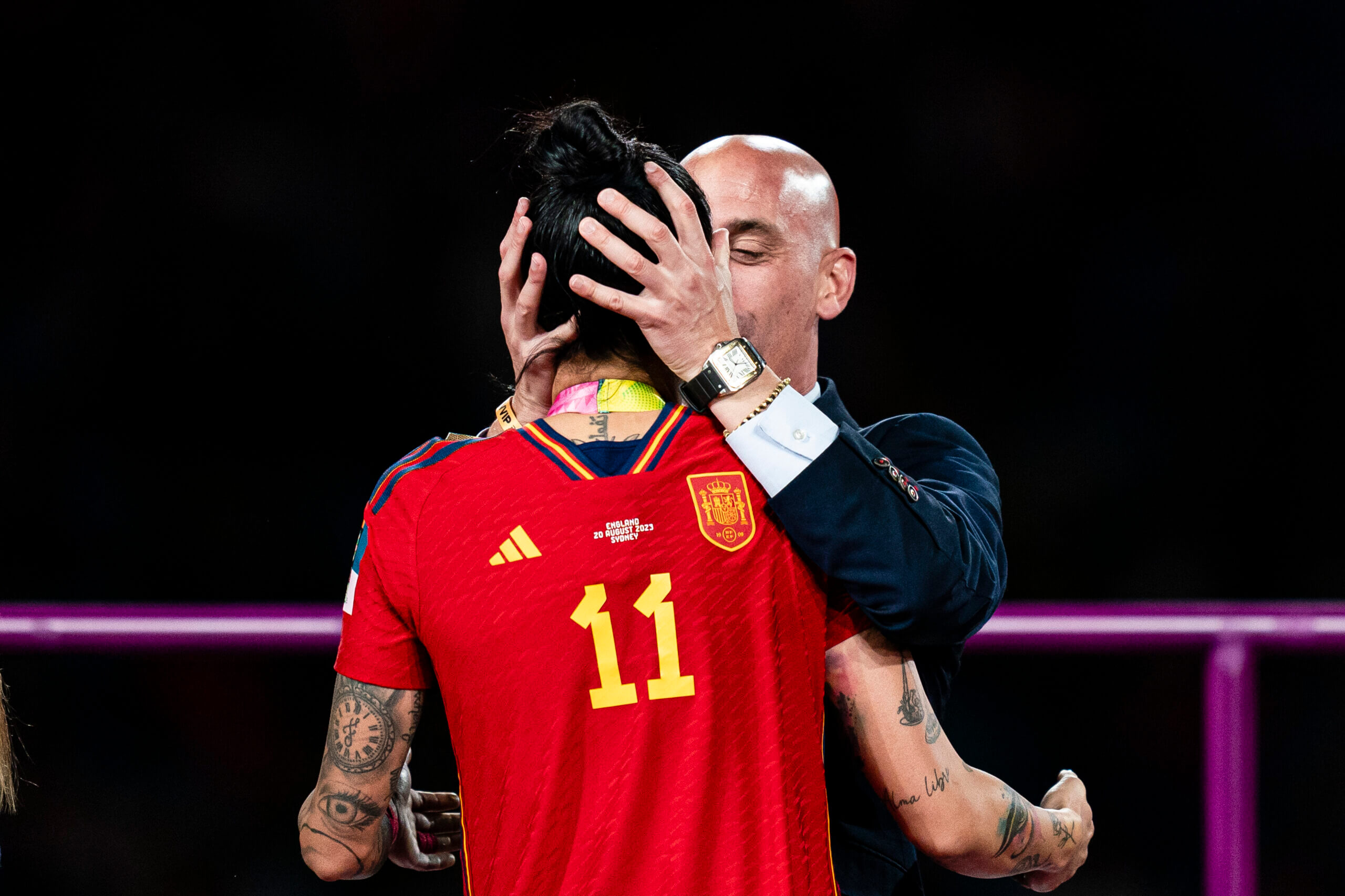
The most salacious allegation was the use of RFEF money to hire a chalet in Salobrena, a coastal village near Motril. What was officially called a work event was actually, the uncle claimed, a party for Rubiales and his closest associates, to which, investigators were told, “eight to 10 (young) women were invited”.
After a judicial investigation was launched, the costs of the event were reportedly repaid to the federation coffers by those who attended. Rubiales showed customary chutzpah when telling Spanish newspaper El Pais that it had been a “work event” which also featured “some leisure time with a barbecue with friends — men and women. It seems now you cannot have people of different genders having a drink and a paella together, which is what we did.”
This was just one of many scandals which began to swirl around Rubiales’ presidency. One in particular came to light due to what became known as the ‘Supercopa Files’ published by Spanish online publication El Confidencial.
An investigation by Spain’s anti-corruption authorities into the deal brokered by former Barcelona and Spain defender Gerard Pique’s company Kosmos to play the Spanish Supercopa (its equivalent to the Community Shield in English football) in Saudi Arabia is still underway. Pique has denied any wrongdoing. Spanish prosecutors are also looking at the use of RFEF money to pay for a trip to New York involving a stay at luxury hotels for Rubiales and his then-girlfriend.
“In the end, it will be shown that I have never misused federation money, never accepted anything that was not mine,” Rubiales said earlier this year.
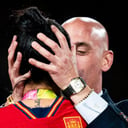
GO DEEPER
Spain won the Women's World Cup - but Luis Rubiales has made me ashamed to be Spanish
There was also embarrassment caused by leaked audio and text messages showing Rubiales’ connections with Spanish politicians. He himself used a specially-designed pen to record conversations, including with former sports minister Irene Lozano, who later told reporters: “I always suspected I was being spied upon.”
Advertisement
The leaks included text messages between Rubiales and Spanish president Pedro Sanchez, in which Rubiales appeared to be trying to pressure the national head of government into taking his side in his ongoing battles for power and influence with La Liga counterpart Tebas.
Rubiales’ reaction whenever a new leak or allegation of wrongdoing was always to vehemently deny any wrongdoing, and blame external enemies — often Tebas. Regular court cases were also begun against those seen as getting in the federation’s way, especially La Liga.
A former staff member told The Athletic that, when it comes to reacting to such controversies, the RFEF legal department is more influential than the communications team, with general secretary Andreu Camps and legal advisor Tomas Gonzalez Cueto very powerful.
Ay señor ! 🫣🫣😧😧 pic.twitter.com/3eyjY69kO0
— JesúsGallego🐬 (@JGALLEGOonfire) August 21, 2023
No statements were ever published without Rubiales and his very closest advisors’ knowledge — and they were often rewritten by the president’s office, or even Rubiales himself. “Every statement is released not just to influence the media coverage, but also preparing for the legal battles which are obviously coming,” one source says.
There is less control on show when Rubiales speaks in public.
He often strays into much more emotional turns of phrase, such as during the press conference in April last year called to react to El Confidencial’s stories about Pique’s lucrative role in the Saudi Supercopa move in 2019.
“This is like a mafia operation, to damage my image,” Rubiales said that day. “I’m just a normal guy from Motril. I go out with my friends, but I do not drink alcohol, do not smoke. I cannot guarantee that tomorrow morning someone won’t plant a bag of cocaine in my car, but I’m sure that I’m the good guy in all of this.”
Rubiales’ first reaction on being told that his kiss on Hermoso was being described as abuse was to label his critics “dickheads” and “losers” in a radio interview.

GO DEEPER
Breaking down what Luis Rubiales did after Spain won the Women's World Cup
The RFEF also released a statement attributing quotes to Hermoso which she later denied having said, threatened her with legal action if she did not change her stance completely to agree with Rubiales’ version of events on the podium that night, and released photos which it claimed backed up what he was saying.
Advertisement
Female members of staff were then obliged to be in the front row for what they believed would be his resignation speech the following Friday, only to hear him again say that the kiss had been a consensual “little peck”. Instead of stepping down, Rubiales took aim at “false feminists” and said he was the victim of a long-running campaign of “social assassination”.
His speech was applauded by many of those present, who would have known that their ultimate boss was monitoring their reactions to it.
“When you talk to this guy, to Rubiales, he intimidates you, for the way he speaks and looks at you,” says a male former federation staff member. “There would have been a very intimidating atmosphere, and people felt obliged to do it (applaud).”
Among those present for that speech was Rubiales’ father, and an emotional part of it was directed at him.
“I’ve been a football fan ever since my father gave me my first football boots aged three years old,” Rubiales said.
“Papa, we are going to get through this. I’ve been able to do many things in my life thanks to parents who have taught me everything and made me who I am today.”
Luis Manuel Rubiales was born in Motril in 1953. A primary school teacher who had studied psychology, he was known as a strong disciplinarian. “It was another era,” one former student told El Espanol, when asked if physical punishment occurred in the classroom.
In 1987, Rubiales senior was elected to the city council representing the PSOE (the Spanish socialist workers’ party), and by 1995 he was mayor, serving until 2003, when political links brought him a post within the Andalusian regional government, also led by the PSOE.
He later returned to Motril to try to become mayor again, but fell out with PSOE colleagues. Following a failed attempt to start his own political party, he retired from public life until an investigation by the Guardia Civil, Spain’s oldest law enforcement agency, implicated him in the alleged misuse of public funds during his regional government role. In 2016, he said in court that he knew nothing about the payments which were under scrutiny.
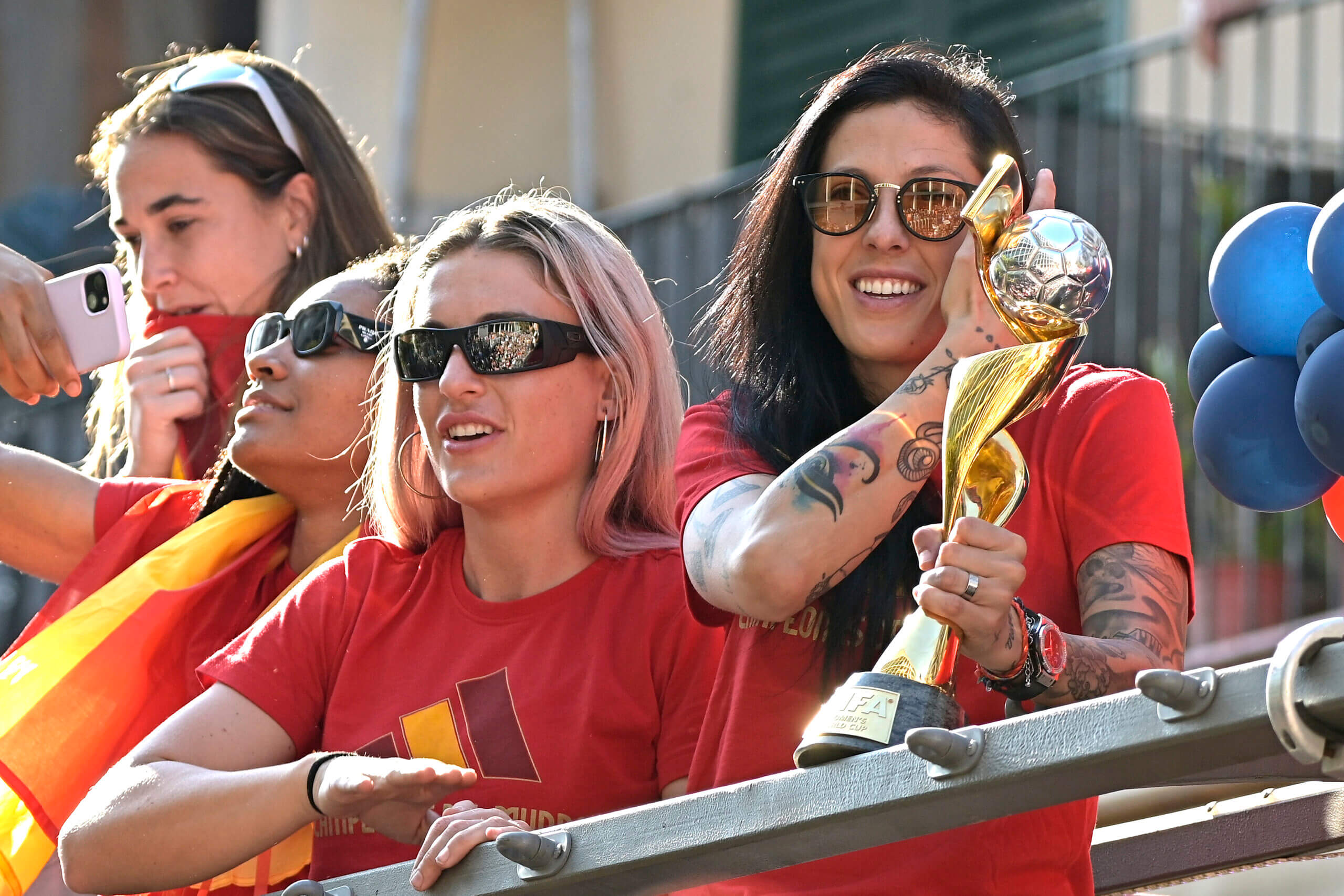
In February 2020, prosecutors in Seville asked for him and eight co-accused to be given prison sentences of three years. Over three years later, the case has yet to be brought to a conclusion.
The family’s status in Motril was nevertheless further formalised when the new RFEF president was awarded the city’s gold medal of honour in June 2021. A local PSOE councillor told The Athletic this week that they now want it to be taken away.
Advertisement
A former RFEF employee said “Rubiales never does anything without consulting with his father”, and during the last week, they have often been together, including at RFEF HQ on the night before that defiant speech.
But the actions of Rubiales’ mother, and her decision to go on hunger strike, opened an entirely new chapter in this already remarkable story.
On Monday, Angeles Bejar made the short walk from her home on Calle Ancha, a street in Motril, to the Church of the Divine Shepherdess and closed the door behind her.
When The Athletic visited Calle Ancha the next day, it was very quiet in the heat of an August afternoon, with none of the noise and activity of just a few blocks away by the church. Patrons at the Cerveceria Nueva Ancha cafe were generally supportive of Rubiales.
One who claimed to have been at school with him said he had already apologised and that politicians should have more important things to deal with. An older man said “women’s rights have gone too far” and made a handcuff gesture.
Tuesday evening then brought a grotesque spectacle inside the church, when Bejar posed for photographs and gave a short interview to reporters, some of whom had been outside for two days.
Wearing make-up that could not hide the very tired look on her face, Bejar again said that the only way she would end her hunger strike was if Hermoso “told the truth”, by which she meant agreeing with her son’s version of the events following the World Cup final. She also claimed that “my son does not want me here” but said she would keep going “as long as my body can take it”.

GO DEEPER
Jenni Hermoso: Record goalscorer, serial swearer and icon of Spanish sport
Reaction to Bejar’s actions, even among those who know her in Motril, was mixed.
Friends and family have held banners outside the church supporting her stance, and also criticising Hermoso. One parishioner angrily accused her on Tuesday evening of holding a “photocall” which interrupted the mass he had come to attend. A family friend said: “She is a woman with a strong mind. The Rubiales (family) are people with strong character, to defend the truth, which is what they have to do.”
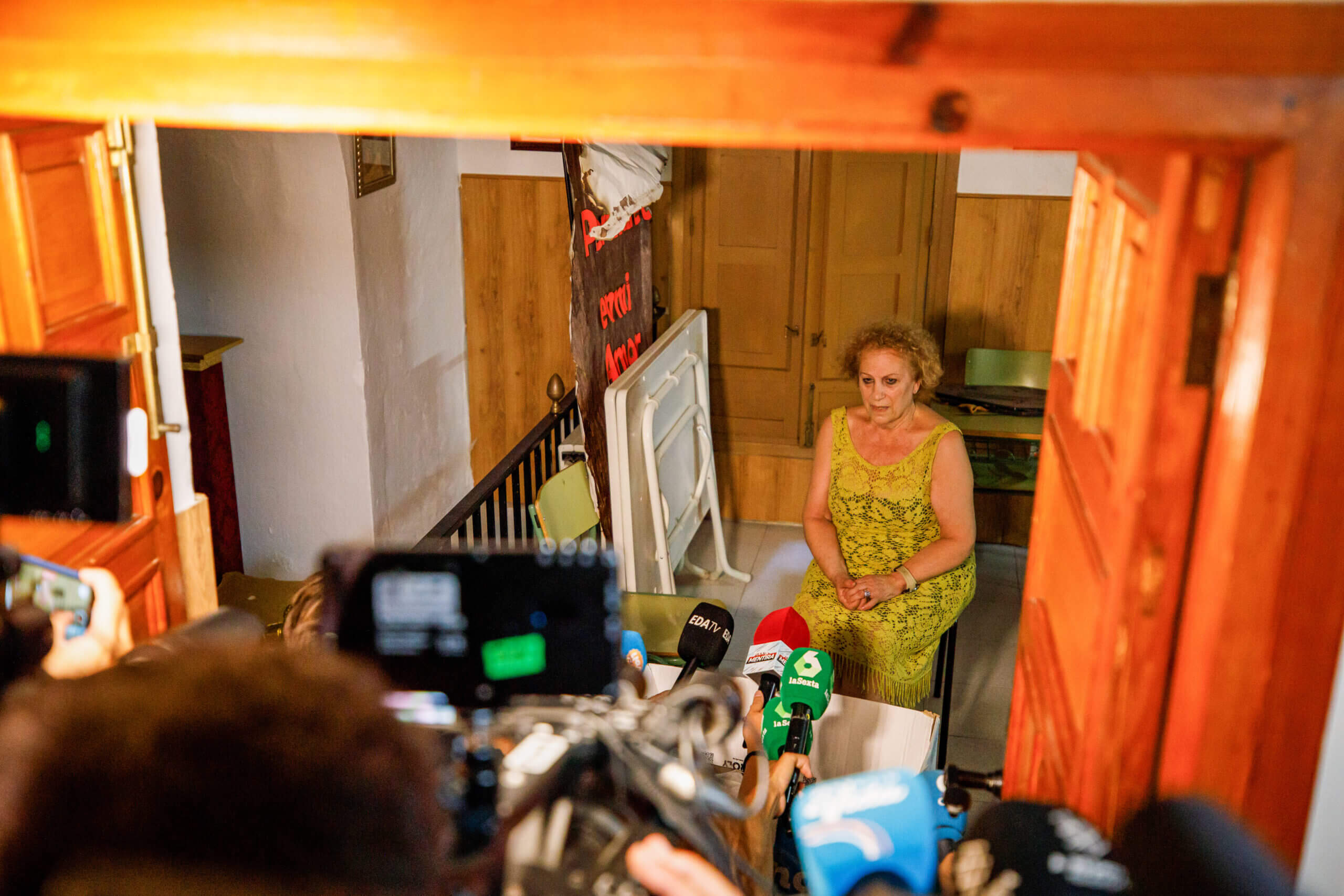
Early on Wednesday evening, a priest appeared outside the church to tell the gathered reporters that, after a “crisis”, Bejar had been taken out through another door to a local hospital. He said she was “very tired, with lots of problems, anxious, dizzy, shaking.”
That ended the hunger strike, and the immediate drama in Motril. As reporters were packing up to return home, or move on to cover the next sensational Spanish story, Juan Rubiales (Luis’ uncle and former chief of staff) spoke publicly for the first time in months.
“I respect the mother, and I know she is suffering,” Juan told El Confidencial. “But my mother is also suffering. [So are] the mothers of 25 people who Rubiales fired from the federation for no reason. Many people who were crushed during his presidency have suffered a lot.”
Meanwhile, there was still no sign of Rubiales himself, or any clear indication of what his next public move would be. He had been in Motril on the Saturday, for the cancelled game of football and barbecue with his friends, but did not show his face at all while his mother was suffering in the church.
Advertisement
By Wednesday he was said to have left the city, scrambling to deal with the latest developments — including the suspension of his €675,761 (£578k; $733k) annual salary at the federation, and an edict from its acting president Pedro Rocha that he surrender his company car, laptop and phone. FIFA’s 90-day provisional ban also means Rubiales’ functions and salary as a UEFA vice-president are suspended, too.

GO DEEPER
Explained: Rubiales' FIFA ban, what comes next and what it means for Hermoso and Spain
This would not have been easy to take, given Rubiales had deliberately picked close associate Rocha as his interim successor last week. But now Rocha, the president of the Extremadura region’s football federation, as well as other former allies were distancing themselves, including Jorge Vilda and Luis de la Fuente, the managers of Spain’s women’s and men’s national teams respectively.
As a UEFA vice-president, Rubiales would usually have attended Friday’s Champions League group-stage draw in Monaco. However, his own actions meant he could not now be there, either.
Even as his supporters deserted him, there was no sign that Rubiales understood he only has himself to blame for what had happened. For him, and the neighbours and family members who continued to fight his case in public, outrage should be directed at everyone else — Hermoso, Tebas, feminist demonstrators, or national president Sanchez and his ministers.
That sense of being persecuted, to the point of paranoia, was now pervading everything the family were doing.
“His mother is suffering because it has now been many years of lynchings,” Demelza Mejias, who is Rubiales’ cousin, said on Monday while her aunt was on hunger strike inside that church in Motril.
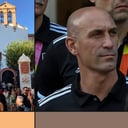
GO DEEPER
A hunger strike, church protests and the day the walls closed in on Luis Rubiales

The same sense of having enemies everywhere had been a constant during Rubiales senior’s route through politics, and his son’s times in charge of AFE and the RFEF. From spying scandals, recording of conversations, or suggesting that someone would plant cocaine in his car, up to the claims that Hermoso had deliberately changed her story as part of a conspiracy to bring him down.
Advertisement
“He is a cowardly man — arrogant, overbearing, obsessed with power and money, but insecure at the same time,” Juan Rubiales told El Confidencial about his nephew on Thursday. “He used the federation to fight against these ghosts he sees everywhere. But his greatest enemy is himself.”
Rubiales is ultimately to blame for everything that happened.
His actions during the celebrations after that World Cup final almost two weeks ago were completely in character and his behaviour since has also been in line with his five years as RFEF president.
For Rubiales, it all started in Motril; and it has almost certainly now ended there, too, in the most surreal and grotesque manner possible.
(Top photo: Oscar J. Barroso/Europa Press via Getty Images)

